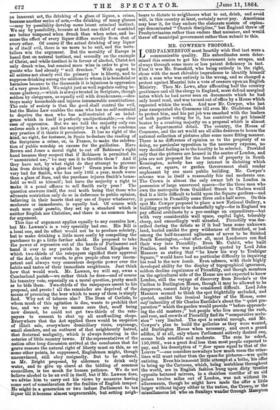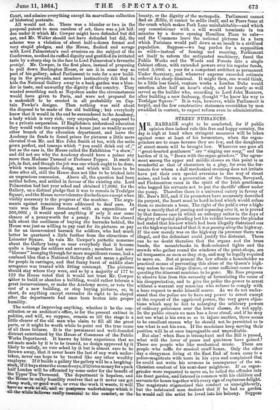MR. COWPER'S PROPOSAL.
T ORD PALMERSTON muet heartily wish that tact were a communicable quality. His subordinates seem deter- mined this session to get his Government into scrapes, and Always through some more or less patent deficiency in tact. First it was Mr. Stansfeld, -who being entirely in the right, chose with the most chivalric imprudence to identify himself with a man who was entirely in the wrong, and so changed a protest against Ilazzini into a vote of censure upon an English Ministry. Then Mr. Lowe, after affronting half the country gentlemen and all the clergy in England, must defend marginal notes which he had never seen on documents which he had only heard read, and was turned out of office by a House which repented within the 'week. And now Mr. Cowper, who last year exasperated the Commons till even MT. Gladstone failed- to protect him, and his pet job was smashed with the leaders of both patties voting for it, has contrived to get himself beaten by a crushing majority on a proposal which is almost one of departmental detail. The country, the House of Commons, and the art world are all alike desirous to house the national collection of pictures after some more fitting manner. There is no difference of opinion as to the propriety of so doing, no particular opposition to the necessary expense, no- very decided feeling as to the locality to be selected. Provided only that the pictures are housed in the centre of London, and jobs are not proposed for the benefit of property in South Kensington, nobody has any interest in dictating which street, or square, or garden Government shall render unpleasant by one more public building. Mr. Cowper's scheme was in itself a reasonably fair and moderate one. The Crown is almost the only owner left in London in possession of large uncovered spaces—.for -the three men who- own the metropolis from Guildford Street to Chelsea would find it a little difficult to build upon the Square gardens—and it possesses in Piccadilly some three and a half acres. On this spot Mr. Cowperproposed 'to place a 'new National Gallery, a building pretty sure to be shamefully ugly—for in England we pay official architects by a per-centage on expenditure—but with very considerable wall space, capital light, tolerably cheap, and exceedingly well situated.- was des- cribed during the 'debate as if it had-been some unknown land, buried amidst the grey wilderness of Stratford, or lost among the half-tenanted uglinesses of never to be -finished South Kensington,—bat 'after all, most Londoners can find their way into Piccadilly. Even Mr. Cubitt, who built Pimlico, and who was pathetically quoted by Lord John Manners as stating 'that "he knew his way to Trafalgar Square," would have had no particular difficulty in inquiring- his road to the new locale. Even cabmen, with their highly developed ability for 'the display of topographical ignorance, seldom decline cognizance of Piccadilly, and though members on 'the agricultural side of the House are not expected to know London, still the voyage of disco-very from Brooks's or the 'Carlton to Burlington House, though it may be allowed to be dangerous, cannot fairly be considered difficult. Lord John Manners seemed to 'think the spot frightfully secluded, and quoted, amidst the ironical laughter of the House, some nail imbecility of Sir Charles Eastlake's about the "quiet pre- paration" which the garden would provide " before approach- ing the old masters ;" but people who live among the rush, and roar, and crowds of Piccadilly find its "comparative seclu- sion" very limited. The spot is central enough, and Mr. Cowper's plan to build the galleries as they were wanted, add Burlington House when necessary, and erect a grand edifice, if at all, only where Parliament actively desired one, seems both sensible and moderate. The sum he asked, 150,0001., was a great deal less than`most people expected to- pay, and his description of "fiber space equal to that of the Louvre "—one considers nowadays how much room the crino- lines will want rather than the space for pictures—was quite enticing. Even his innocent little attempt at a bribe, 'his offer to bring up the Cartoons which, being matchless throughout the world, are in English fashion hung upon dirty trestles opposite battered mirrors, in a chairless corridor of an old palace twelve miles out of London, was not without its allurements, though he might have made the offer a little larger without injury either to the nation the 'Crown, or the miscellaneous lot who on Sundays WfUlde; 'Hampton Court, and admire everything except its marvellous collection of historical portraits.
All would not do. There was a blunder or two in the proposal patent to men careless of art, there was a job hid- den under it which Mr. Cowper might have defended but did not, and Mr. Walter should not have defended but did, the scheme was a violation of about half-a-dozen formal and very stupid pledges, and the House, flushed and savage with Lord Palmerston's cool evasions on the subject of the Conference soothed its ruffled dignity and gratified its irritated taste by a Conference, slap inthe face to Lord Palmerston's favourite protegi. Mr. Cowper, in the first place, instead of proposing to pull down Burlington House, or use it in some way as part of his gallery, asked Parliament to vote for a new build- ing in the grounds, and members instinctively felt that to hide the National Gallery away in a back garden was a blan- der in taste, and unworthy the dignity of the country. They wanted something such as Napoleon under the circumstances would have given to Paris, and were not prepared for a makeshift to be erected in all probability on Cap- tain Fowke's designs. Then nothing was said about the disposal to be made of the old building; but everybody knew that it would in the end be surrendered to the Academy, a body which is very rich, very unpopular, and supposed to be a private corporation. If Englishmen understood education they would vote the corporation a house just as readily as any other branch of the education department, and leave the Academy its funds to found prizes for pictures a little more elevated than Mr. and Mrs. John Smith at tea, with the satin gown perfect, and teacups which " you could drink out of;" but as the ease is, the House called the Exhibition "a show," and did not see why the Academy should have a palace any more than Madame Tussaud or Professor Pepper. It smelt a job, in fact, and though the job was one which ought to be done, which wants immediate doing, and which will have to be done after all, still the House does not like to be tricked into an ungracious concession. Above all, the question had been settled before, and settled in favour of the existing site. Lord Palmerston had last year asked and obtained 17,000/. for the Gallery, on a distinct pledge that it was to remain in Trafalgar Square, and the House never tolerates disobedience except when visibly necessary' to the progress of the machine. The argu- ments against remaining were addressed to deaf ears. In vain was the House threatened with an expenditure of 500,0001.; it would spend anything if only it saw some chance of a pennyworth for a penny. In vain the absurd talk about the costliness of buying the barracks behind, the House was just as willing to pay rent for its, pictures as pay it for an inconvenient barrack for soldiers who had much better be quartered a little further from le attractions of Leicester Square. In vain Mr. Cowper's pathetic nonsense about the Gallery being so near everybody that it became quite a lounge for soldiers and servants ; members had seen "blouses" lounging through far more magnificent roams, had a confused idea that a National Gallery did not mean a .gallery for people in carriages, and that funny burst of middle class arrogance was treated with fitting contempt. The pictures should stay where they were, and so by a majority of 177 to 122 the House voted that it would not trust Mr. Cowper gither to build or abandon a building, would rather tolerate a great inconvenience, or make the Academy move, or -vote the cost of a new building, or stop buying pictures, or, in short, do anything except surrender its right to be obeyed after the departments had once been beaten into proper humility.
The notion of improving anything, whether it be the con- stitution or an architect's office, is for the present extinct in polities, and will, we suppose, remain so till the stage is a little clearer of the old men who claim to 'fill all the great parts, or it might be worth while to point out the true cause of all these failures. It is the permanent and well-founded distrust entertained by the House of Commons- of the Public Works Department. It knows by bitter experience that no estimate made by it is to be trusted, no design approved by it likely to satisfy, no vote asked by it but is almost sure to be thrown away, that it never heats the last of any work under- taken, never can hope to be -treated like any other wealthy employer. If it builds a gallery the gallery will be a laughing- stock, if it buys stone the stone decays, if it:votes money for a park half London will be affronted' by.some order for the benefit of the Upper Ten Thousand. The department is hopeless, and the House in sulky humility resolves that as it never can get cheap work, or good work, or even the work it wants, it will have no work at all, and so postpones undertakings which it all the while believes really essential to the comfort, or the beauty, or the dignity of the metropolis. Parliament cannot find an JEdile, it cannot be redile itself, and so Peers fume at the crush which makes Park Lane uninhabitable—and which any commissioner with a will would terminate in ten minutes by a decree opening Hamilton Place to cabs— and the Commons leave the national pictures in a barn which Parisians would pull down as an insult to a civilized population. Suppose—we beg pardon for a supposition so wild—instead of fuming and sneering, Parliament set itself to reform the antiquated machinery, fused the Public Works and the Woods and Forests into a single Cabinet officer, with extended powers over his regular funds, voted 3,000/. a year for a competent architect as permanent Under Secretary, and whenever expense exceeded estimate ordered his sharp dismissal. It might then, one would think, be a little less timid, venture works a London Duke would sanotion after half an hour's study, and be nearly as well served as the builder who according to Lord John 'Manners, after building a new faubOurg, thought "he knew his way to Trafalgar Square." It is vain, however, while Parliament is torpid, and the few constructive statesmen overridden by men swaddled in content, to expect reform even in administration.





























 Previous page
Previous page